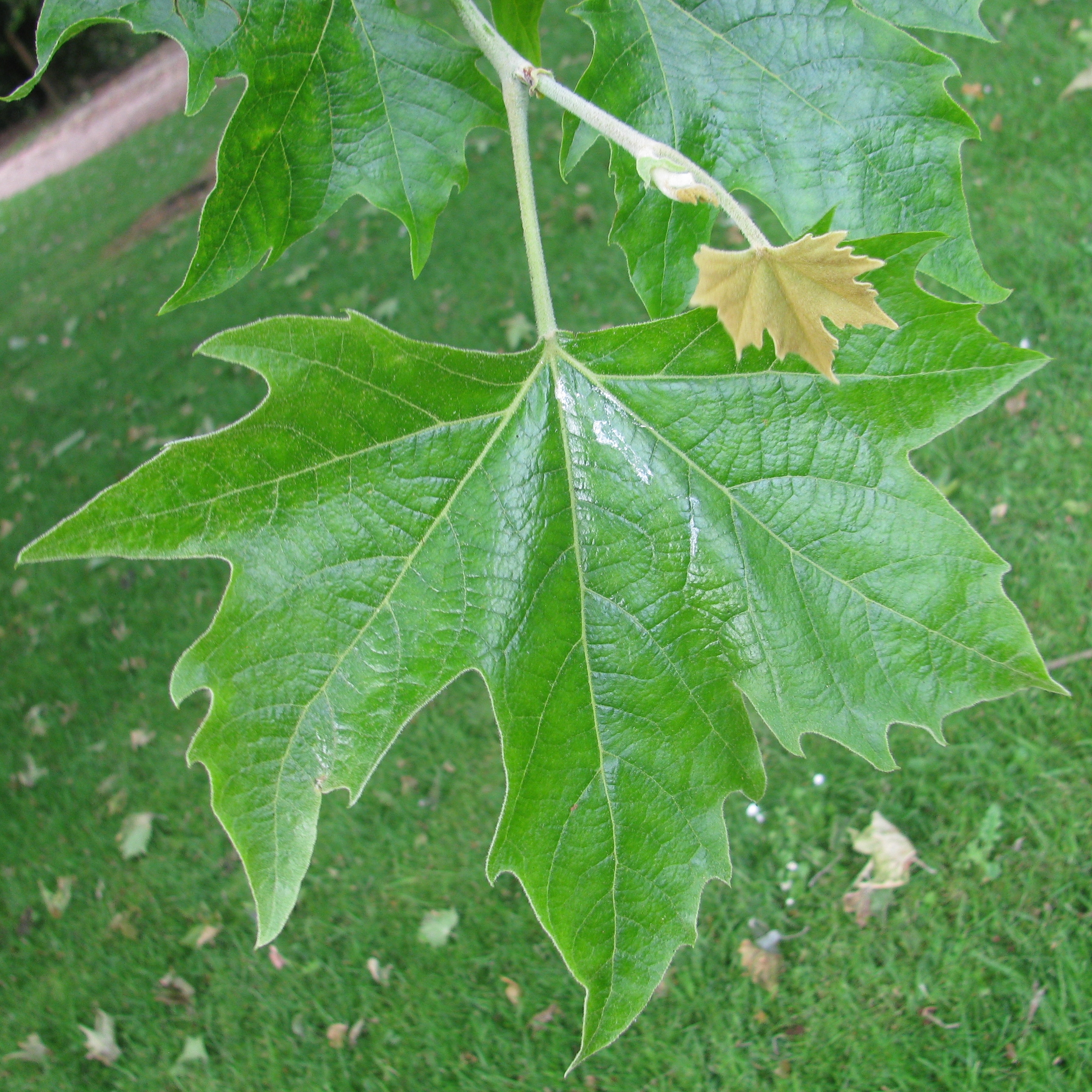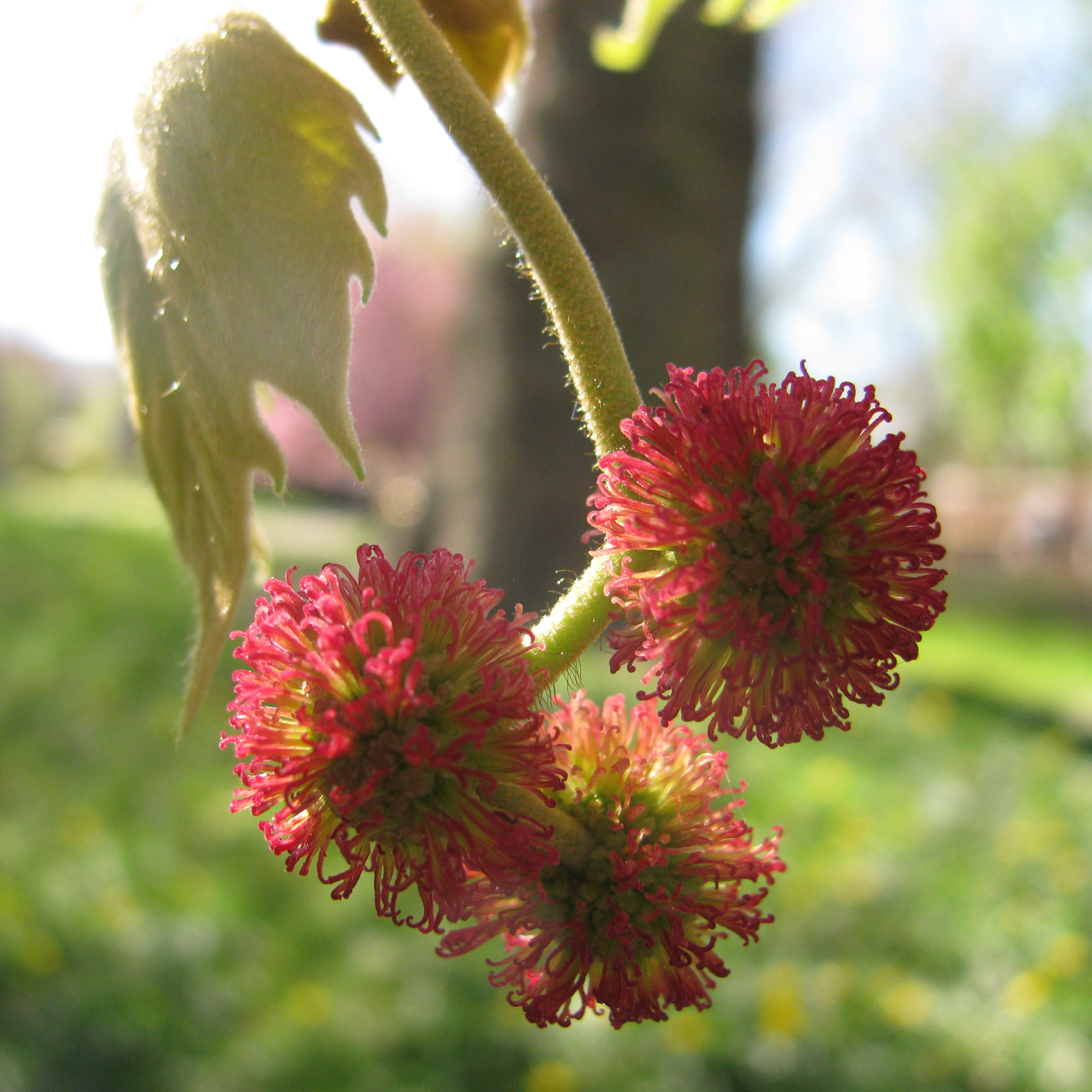| Family: | Platanaceae |
| Genus: | Platanus |
| Species: | x hispanica |
| Common name: | London Plane |
| Height: | 30m |
| Spread: | 20m |
| RHS AGM |
Hybrid of P. occidentalis (eastern USA) x P. orientalis (south eastern Europe), first recorded around 1663.
In spite of its common name, the species name means ‘Spanish’.
A tall and handsome deciduous tree with a broad upright crown, growing to a height of 30m with a spread of 20m. Hardiness H6.
Palmate leaves open fairly late from large purple buds, and are fresh green on opening, maturing to large leathery and green, similar to sycamore leaves (hence synonym P. x acerifolia). Leaves turn rich orange-yellow before falling.

At the same time as the leaves open, globular flowers are borne on long stalks, female (red) and male (smaller and yellow) on difference stems. After pollination, the female flowers develop into dark spiky fruits, which hang from long stalks, gradually disintegrating over the winter as the seeds at their centre are disbursed.

Bark is made up of patches of different shades of grey-green and beige, resembling desert camouflage. Shoots have large purple alternate buds in winter.
From in full sun in any well-drained soil, preferably acid but happy in neutral and tolerates alkaline. Prefers to be warm and sheltered, but in milder areas will be happy in an exposed position. Extremely tolerant of polution and thrives in coastal areas.
Plane Anthracnose (Apiognomonia errabunda) may cause leaf-drop. Two fungal pathogens, Massaria disease (Splanchnonema platani) and Plane canker (Ceratocystis platani), can be fatal to London plane and are present in continental Europe. Generally pest-free.
Propagate by hardwood cuttings or suckers in late autumn or winter.
Popularly used in urban areas, where it may be pollarded to keep at a managable height or allowed to form an avenue of dappled shade. However, it should not be planted too close to buildings due to its vigorous roots.
****
March 2012
They say you can’t know a person until you’ve walked their mile. So here – go ahead.
On a spring evening, a soft slip of peach cloud beckons from a crystalline sky. You lock the door, brush against the newly-woken lavender that lines the front garden, turn left into the street and start walking.
You pass the house opposite where five boys live and where your son wishes to emigrate. On past the house to which six taxis belong, and which is ruled over by a woman with the loudest voice you ever heard.
At the top of a side street off to the right, Laughing Man sits on the wall in front of his house. This ancient Indian is dressed, as usual, in a pristine white salwar kameez, one salwar leg tucked and pinned under the stump just above where his right knee should be. He laughs merrily at everyone he sees and you remember he always laughed particularly joyously at your son, who was initially embarrassed but who learned to join in and laugh along.
You cross the road to avoid the path of the cadaverous man who stoops around the block twice a day and who, in your personalised set of superstitions, is equivalent to a black cat. He has papery skin in a dull blue shade of white, his eyes are watery and inert. Even his beige clothes look sapped, the colour draining down to collect in his dark brown slippers. You imagine his body is pumped so full of drugs that his spirit has dissolved; any remaining sparks of vitality gather in his fingers that flutter at the end of lifeless arms hanging behind his thighs. You almost wonder what he has been saved from if this is the better alternative, but you stop just in time.
On a distant corner you see the Atwal Empire. The Atwals are two brothers and their wives, who are sisters – one modest and sedate, the other sharp-featured and quick-witted. They started with one little corner shop and have gradually taken over the two larger shops nearby. What is now Atwal’s Kebabs used to be Li’s Chinese Chippy. Years ago, your friend took you there and bought a Chinese takeaway for the two of you – your first ever taste of Chinese food. You were so excited that you wore the most beautiful garment you owned: a cornflower-blue silk empire-line nightdress. The large newsagents opposite used to be Rawlings Butchers, where you were sent to fetch bones for the dog. You went for years before you realised that you didn’t actually own a dog, and it was only recently that you worked out that the bones were really to make the soup that your parents ate before tea, presumably to leave more food for four growing children.
You turn left and head up the hill. Pete is on duty outside his hostel at the crossroads, directing traffic with one hand while the other waves his can of cider. He briefly shows you a gummy lopsided smile before his dignified concentration is restored. One day late last summer, you were hacking back the lavender when Pete passed by with his mate, Barry (earthworm-pink lips and eyes begging for approval – he makes you uneasy). Pete asked if he could give you some money, ‘to help with the kids’. You were not offended.
Halfway up the hill, you turn left at the corner where the Butler’s old house stands. Mr and Mrs Butler had two daughters. Fiona Butler was aged between you and your sister and was an occasional playmate. Linda Butler was older and had Down’s Syndrome; she boarded at an institution in the week and was hidden away like a guilty secret at the weekends. Her mother once gave your mother a bag of Linda’s old clothes and although you remember one dress being beautiful cameo green polyester with frilly sleeves, you could not bear even to try it on because you didn’t know if what she had was catching.
On the street where you used to live, you approach your parent’s house which is too big and too old for them, but which they refuse to give up. You smile, shake your head and mutter ‘mad as cuckoos’ as you recall a recent trip to Sainsbury’s where you bumped into first your father, then your mother, each with their own trolley, their own route, their own list printed in your father’s calm square hand. You notice that whereas when you knew them, they were two disparate people leading totally separate lives, age has reduced them to a single unit: they now function only as a pair. You wonder what will happen when death breaks the bonds that old age has formed. Passing your childhood home, you further wonder if, on balance, your childhood could be considered good or not, and whether it even matters. You always believed the balance was in your favour until that day in Spring 1991 when, while washing up, a splinter entered your thoughts like a sliver of glass from the Snow Queen’s mirror. You snap your mind shut and walk on, walk on.
Two doors down is the family home of your arch enemy. You were fifteen and a budding goth when they moved in. With her long black hair, white skin and naturally sour face, you felt out-gothed and spent many happy hours practising dirty looks on her at the bus stop. Your first serious boyfriend, who was to become your husband, went out with her shortly before you and he started dating, and they have been together again since shortly after you and he split up. But before you get cynical, just remember – you have two amazing children and the independence you yearned for, so how can you regret anything?
At the top of the hill you turn left down the main road, past the house of the friend who insisted you call her Banana at all times, whose father called you ‘the brick’ and whose Italian mum filled the house with the vomit-stench of parmesan and chuckled at your attempts at eating spaghetti before cutting in into matchstick lengths and handing you a spoon.
You turn left again, into a wide leafy lane with a mixture of houses from old mansions to a modern apartment block. Yews tower and huge cypresses link grey-green arms to form a roof over the street. Between these giants are spring blossoms, hairy-budded horse chestnuts and rowans, whose leaves in autumn turn to harlequin fingers. Midway down is your favourite: a massive plane tree. You had never noticed plane trees until you went to Paris and it was there you fell in love with their gloom; the psoriatic bark of flint-coloured scales and the bunches of dark spiky balls that hang from the boughs throughout winter like misanthropic baubles. And now you love it most of all because each morning as you trudge to work, wherever your head is, you walk within the spell of the plane and you are back on the Left Bank.
You pass the Bettaware man delivering his catalogues. He is old and small with thick hair bristling out of his large ears and eager front teeth so that once when your daughter came into the kitchen and whispered ‘Mr Tumnus is here’, you knew exactly who she meant. You think he is a lonely man and when he comes to collect his catalogue you don’t mind chatting for five minutes but you wish his eyes wouldn’t stray from your face.
Passing the refuge on the corner, you see a naked oriental toddler looking down from an upstairs window. You smile and he mouths words he is too young to know. You walk on.
At the top of your road, a van straddles the kerb, leaving only a narrow walkway. As you approach, a young lad walks up towards the same constricted strip of pavement. His mobile phone asserts tinny beats. You know his sort. But look, he’s stopped a few feet from the van and is waiting. You walk though the gap, then you smile and thank him. His skin makes you think of chocolate blancmange and you notice the openness in his young face. You carry on homeward, watching the crooked old branch of a cherry tree, covered in flushes of sherbet blossom, as it takes aim at the Spring-fresh sky.
You turn in by the lavender.
We walk up through the garden.
And I am home.
